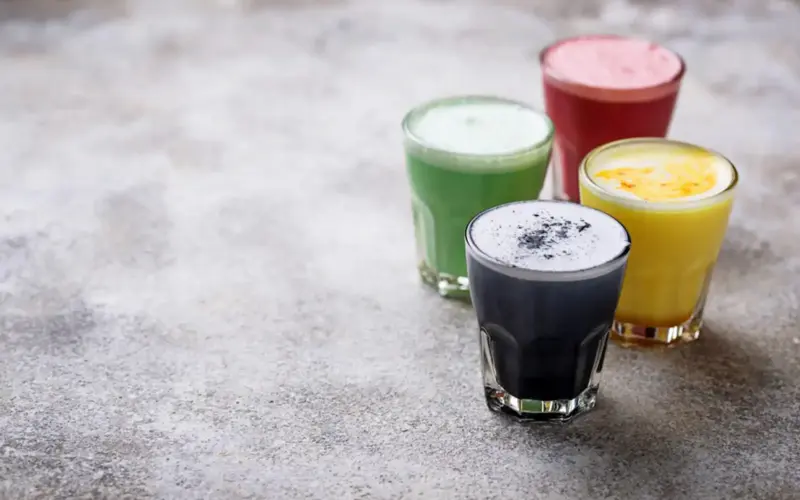Ever get tired of that all-too-familiar sugar crash after sipping on a store-bought energy drink? If so, you’re definitely not alone.
Natural alternatives are out there, and they can give you a real boost—without all the weird artificial stuff.
When you reach for drinks with ingredients like green tea, yerba mate, or botanical extracts, you’re basically fueling up with energy that feels a lot more in sync with your body.
Natural energy drinks offer sustained energy without artificial additives, excessive sugar, or the jitters that often come with conventional energy drinks.
Plenty of natural energy options come packed with antioxidants and vitamins, so you’re not just getting a pick-me-up—you’re actually supporting your health, too.
There are ready-made versions that are zero sugar , or you can get creative and make your own with simple recipes.
Mixing up your own energy drinks at home means you know exactly what’s in them.
Try honey and lemon or green tea for a subtle lift. These natural alternatives can really help you stay sharp and focused, without forcing you to compromise your health goals.
Coconut Water
Coconut water’s become a favorite natural energy drink for folks looking to ditch artificial beverages.
It comes straight from young, green coconuts and has this light, slightly sweet taste that’s honestly pretty refreshing.
Its nutritional profile is pretty impressive. You’re getting brain boosting electrolytes like potassium, magnesium, and sodium—essential for hydration and keeping your body’s fluids balanced.
Unlike most commercial energy drinks, coconut water gives you a gentle energy boost, minus all the synthetic extras and sugar overload.
Your body absorbs its nutrients quickly, so it’s a solid pick for natural hydration.
Benefits of Coconut Water for Energy:
- Natural electrolyte replacement
- Gentle, sustained energy without crashes
- No artificial ingredients
- Low in calories
- Rich in essential minerals
Some brands have even rolled out sparkling coconut water with caffeine for a little extra zip. It’s the hydrating benefits of coconut water, plus a moderate caffeine bump.
After a workout, coconut water can help you bounce back by replenishing lost fluids and minerals. Sure, it’s got less sodium than most sports drinks, but it still offers natural carbs to help refuel your energy stores.
For a more pronounced kick, some products like Flova pack coconut water with enough caffeine to rival a big cup of coffee (about 142mg, give or take).
Honestly, you can drink coconut water straight from the fridge, pour it over ice, or use it as a smoothie base. It’s versatile, and it just works.
Green Tea
Green tea energy drinks are a classic way to get a natural lift. They blend the time-tested benefits of green tea with modern convenience.
The real star here is caffeine. Most servings clock in at about 150mg, but since it’s from green tea extract, it tends to feel a bit smoother than synthetic sources.
Unlike your average energy drink, green tea options usually skip the sugar. If you’re watching calories or blood sugar, that’s a big win.
Many brands toss in B vitamins and vitamin C for a little extra pep. These help your body turn food into energy more efficiently—always handy.
Benefits of green tea energy drinks:
- Natural caffeine source
- Low or zero sugar options
- Added vitamins and minerals
- Antioxidant properties
- Smoother energy without jitters
You’ll find these in bottles or in stick packs for mixing on the go. Powders are a lifesaver when you need a quick boost away from home.
Flavors get creative—tropical blends like Green Mojo mix green apple, pineapple, and mango for something a bit different.
Some folks say their bodies handle green tea caffeine better than other sources. The energy feels focused, and there’s less of that crash-and-burn effect.
Yerba Mate
Yerba mate isn’t just a trend—it’s a traditional South American herb that delivers a natural energy boost without the dreaded crash. People have been relying on this plant for centuries for its energizing qualities.
With yerba mate, you’re sipping on natural plant-based caffeine —about 150mg per serving. It’s not synthetic, so the energy release feels smoother and, honestly, more manageable.
What sets yerba mate apart? You get focus and alertness, but without the jitters or the sudden drop-off that comes with some other caffeinated drinks. Your body handles this natural caffeine in its own way, which leads to a cleaner, more sustained boost.
Yerba mate contains antioxidants that are good for overall health, especially your heart and blood vessels. Some people even find their mental clarity improves after drinking it.
You’ve got options for how to enjoy yerba mate:
- Sparkling energy drinks
- Still beverages
- Traditional loose-leaf tea
- Ready-to-drink cans and bottles
Brands like Yerbaé and Clean Cause keep things organic and simple. (Cool side note: Clean Cause donates 50% of profits to addiction recovery programs.)
Matcha
Matcha is powdered green tea with a kick. It’s a natural energy boost that won’t leave you jittery or crashing like coffee sometimes does. Since you’re actually consuming the whole leaf, you get a lot more out of it.
The caffeine in matcha is a bit of a different animal. Thanks to L-theanine , an amino acid, the energy release is slow and steady—sustained energy for up to 6 hours. Ideal if you’re trying to stay on your game all day.
Most matcha drinks come in at around 80mg of caffeine from green tea. That’s about the same as a standard coffee, but it just feels less harsh. Matcha energy products are super convenient, too:
- Ready-to-drink cans (sometimes lightly sparkling)
- Energy sticks or packets for mixing
- Ceremonial grade powder if you’re feeling traditional
You’ll find matcha drinks in flavors like lemon and strawberry , which makes things more interesting. A lot of brands throw in B vitamins and vitamin C for an extra energy edge.
The best matcha is shade-grown in Japan , especially in places like Kyoto where they’ve been perfecting it for ages. This method boosts the chlorophyll content, giving matcha its signature green color and a solid nutritional punch.
People on Reddit and elsewhere call matcha’s energy a “slow burn” —not a spike. It’s great for mornings or those mid-afternoon slumps when you want gentle, steady energy instead of a rollercoaster.
Beetroot Juice
Beetroot juice is a pretty potent natural energy drink if you’re after a steady boost—without the weird crash you get from some of those neon cans. That deep red color? It’s loaded with nitrates, which your body turns into nitric oxide.
This process is key for getting your blood flowing better and even helping lower blood pressure. With improved circulation, your muscles get more oxygen, so you feel naturally energized—no drama, just better stamina.
Lots of athletes swear by beetroot juice before workouts because it can boost stamina and strength . There’s research backing the idea that it helps you push through longer sessions with less fatigue.
Key Benefits:
- Improves blood circulation
- Enhances oxygen delivery
- Supports heart health
- Boosts exercise performance
- Speeds up metabolism
You can grab beetroot juice ready to go, or try powdered supplements that mix with water. Some brands toss in other ingredients for extra perks.
Want to make your own? Here’s a super simple recipe:
- Blend 1 medium beetroot (peeled)
- Add 1 apple and 1/2 cucumber
- Drop in a small piece of ginger
- Strain and drink up
This DIY natural energy drink is fruity and fresh, but still brings all the energizing benefits of beets to the table.
If you’re after an extra kick, check out beetroot drinks with B vitamins or green tea extract . That combo keeps your metabolism humming and your energy steady all day.
Lemon Water With Honey
Need something simple that actually works? Honey lemon water could be your go-to. It’s just two kitchen staples, but together, they give you a nice energy lift—no caffeine jitters, no sugar crash.
It’s ridiculously easy to make, too. Here’s the basic idea:
Basic Recipe:
- 3 tablespoons honey
- 1/4 teaspoon salt
- 1 cup hot water
- 2 tablespoons lemon juice
- Filtered water to make 32oz (4 cups)
This blend is a natural detox drink that gives you a quick energy boost and helps your system flush out the junk.
Why does it actually help? Honey’s full of natural sugars that your body uses for fuel, but it doesn’t spike and crash like table sugar. You get a smoother ride.
Lemon brings in vitamin C and antioxidants, so your immune system gets a little love while you get stuff done. Plus, that citrus zing is just good.
This mix can give you lasting energy for hours—no shakes, no crash. It’s a favorite with athletes and anyone who’d rather skip the energy drink aisle.
Drink it hot, drink it cold, whatever you like. Some folks even go for a sparkling version with carbonated water instead of plain.
Chia Seed Water
Chia seed water, or chia fresca , is one of those natural energy drinks that’s almost too easy. You just need water, chia seeds, a splash of lemon or lime, and a little sweetener if you want.
Soak chia seeds in water and they puff up with a gel-like coating , giving the drink a fun texture. It’s kind of weird at first, but honestly, it grows on you.
This stuff has roots with the Tarahumara people of Mexico—famous for their insane endurance running. They called it “iskiate” and used it for long-lasting energy.
Key Nutrients in Chia Seed Water:
- Omega-3 fatty acids
- Fiber
- Protein
- Calcium
- Magnesium
- Phosphorus
With all that, chia water is great for hydration and gives you a gentle, steady boost—no sugar highs or caffeine crashes. It also helps you feel full longer, so maybe you’ll snack less, and the fiber is a win for digestion.
Quick Recipe:
- Stir 1-2 tablespoons chia seeds into 2 cups water
- Add fresh lime juice and honey to taste
- Let it sit about 10 minutes, stirring now and then
- Drink before or during exercise for a natural lift!
You can totally switch it up with other fruit juices or different sweeteners. Make your chia fresca your own.
Ginseng Tea
Ginseng tea is a classic when it comes to natural energy drinks. Made from ginseng root, this caffeine-free beverage gives you a gentle lift—no wild swings or crashes.
It’s the ginsenosides in ginseng that are thought to help with mental sharpness and dialing down fatigue. Some folks find Korean Red Ginseng extract gives them steady energy through the day.
Benefits of Ginseng Tea:
- Natural energy enhancement
- Improved mental focus
- Reduced fatigue
- No caffeine jitters or crashes
You can find ginseng tea as loose roots, tea bags, or even ready-to-drink blends with other herbs. There’s something for everyone.
Try a cup in the morning or early afternoon. Most people feel the effects for 4-6 hours, so it’s a solid pick for beating that mid-day slump.
It’s usually free from added sugars or weird stuff, which is nice if you’re watching calories or just want something simple. Some premium picks use 6-year-grown roots —they’re pricier, but some say the effects are stronger. Worth a shot if you’re curious.
Kombucha
Kombucha is a fermented tea that’s exploded in popularity as a natural energy alternative. It’s fizzy, tangy, and gives you a nice, steady lift—way less intense than chugging a regular energy drink.
What sets kombucha apart is its fermentation process. You get natural caffeine from the tea, plus probiotics and organic acids. The combo seems to help with a more balanced energy boost—none of that jittery spike.
Some brands are even selling kombucha as energy drinks now, often packing 80-130mg of caffeine in a bottle. That’s a decent hit, but it feels smoother somehow.
If you’re into DIY, you can make your own kombucha energy drink at home. Try tossing in:
- Ginger for a little heat and better circulation
- Berries for antioxidants and a pop of sweetness
- Mint or other herbs for a fresh twist
Companies like Remedy have their own energy kombucha lines, using stuff like green coffee bean and ginseng. Usually, there’s no added sugar—just clean, steady energy.
Most kombucha energy drinks come in grab-and-go bottles, which is handy if you’re busy and need a quick pick-me-up that’s not loaded with artificial junk.
Wheatgrass Juice
Wheatgrass juice is a punchy natural energy booster that’s bursting with nutrients and can help you feel more awake and switched on. It’s that bright green stuff made from the young shoots of wheat—yeah, the same plant that gives us bread, only this is way more vibrant.
Wheatgrass is loaded with chlorophyll , which is thought to help detox your body, amp up your energy, and give your immune system a little nudge. That deep green color? All chlorophyll, baby.
Your body can soak up wheatgrass benefits in a bunch of ways:
- Natural energy boost—no caffeine jitters or sugar crashes
- Rich in vitamins like A, C, E, and B6
- Packed with minerals for general wellness
- High in antioxidants to help fight off free radicals
Wheatgrass can help with digestion and may cut down on that sluggish, tired feeling, especially when you hit that afternoon wall. Some folks even swear it sharpens their focus when they drink it regularly.
You can get your wheatgrass fix in a few forms, depending on what fits your life best:
| Form | Benefits | Best For |
|---|---|---|
| Fresh juice | Maximum nutrients | Home use with juicer |
| Powder | Convenient, longer shelf life | Travel, busy schedules |
| Ready-to-drink | No prep needed | On-the-go consumption |
Zero sugar versions exist if you’re trying to dodge extra sugar. Some even toss in flavors like lemon to help with the strong taste.
Honestly, wheatgrass on its own can taste a bit… grassy. Try mixing it with pineapple for a tropical energy elixir . The pineapple’s sweetness really takes the edge off.
Apple Cider Vinegar Drink
Apple cider vinegar (ACV) drinks give you a natural energy lift—no sugar spikes, no hard crash. The tangy vinegar gets paired with other tasty stuff to make a surprisingly refreshing pick-me-up.
Why do ACV drinks give you energy?
- Natural caffeine (sometimes, if there’s green tea in the mix)
- B vitamins to help your metabolism hum along
- Electrolytes for hydration
Drinks like Pureboost Superfoods Clean Energy Booster combine ACV with green tea caffeine (about 100mg), so you get a nice, clean buzz without the wired feeling. Way better than most energy drinks, at least in my book.
You can totally make your own ACV energy drink at home. Just stir 1-2 teaspoons of ACV into a glass of water. It’s simple, and some people say it gives an instant energy kick if you drink it first thing in the morning.
If the taste is too much, try these add-ins:
- Honey for a little sweetness
- Lemon juice for a vitamin C boost
- Ginger for your gut
- Cinnamon to help with blood sugar
Options like Bragg Organic Apple Cider Vinegar Refreshers come in flavors like ginger lemon honey, and they’re zero sugar or super low in sugar.
Black Hills Honey Farm makes “Honeygar”—raw honey, ACV, and blackstrap molasses, all blended for a nutrient-packed energy drink in a few flavors.
Just a heads up: always dilute ACV. Straight vinegar can be rough on your teeth and throat.
Smoothies With Banana And Peanut Butter
Banana and peanut butter smoothies are a classic for a reason—they’re tasty, filling, and give you a natural energy boost when you need it most. Sometimes you just want something simple and satisfying, right?
The basic peanut butter banana smoothie only needs a few things. Bananas bring the natural sugars and slow-burn carbs, while peanut butter tosses in some healthy fat and protein.
Basic Banana Peanut Butter Smoothie Recipe:
- 2 ripe bananas (frozen is even better)
- 2 tablespoons peanut butter
- 1-2 cups milk (dairy or plant-based—whatever you like)
- 1-2 tablespoons honey (if you want it sweeter)
- Ice cubes
If you want more protein, add a scoop of Greek yogurt. It turns your smoothie into a post-workout drink, and a cup of Greek yogurt can add up to 20 grams of protein. Not bad, right?
You can upgrade the nutrition with oats, chia seeds, or a pinch of cinnamon. Oats add fiber, which helps keep your blood sugar steady so you don’t crash an hour later.
Need a morning jolt? Try an energy coffee version —just add a shot of espresso or cold brew to the banana-peanut butter base.
There’s no one way to make these. Change up the liquid or ice for a thicker, spoonable breakfast bowl, or thin it out for a lighter drink. It all depends on your mood.
Acai Berry Juice
Acai berry juice is having a moment as a natural energy drink, and honestly, it’s easy to see why. This deep purple juice comes from the acai palm, native to South America—kind of exotic, kind of cool.
If you’re hunting for a natural energy boost, Sambazon’s Original Acai Berry Amazon Energy Drink is a solid option. It’s got that clean, fruity vibe and skips the artificial junk you find in so many energy drinks.
The real magic of acai is in its nutritional punch. These berries are loaded with antioxidants . Some drinks even have up to 310% of your daily vitamin C in one serving. That’s a lot. Antioxidants help your body handle stress and, yeah, keep you energized.
What sets acai energy drinks apart is the natural caffeine sources. Most use a mix of:
- Yerba mate
- Green tea
- Guarana
Plant-based caffeine just feels smoother—less of that harsh crash you get from synthetic stuff.
Organic acai berry energy drinks usually have a fresh, fruity taste. They’re sweet, but not in a fake way, and way more refreshing than the usual energy drink lineup.
If you care about quality (and maybe the planet), look for Fair Trade and organic labels. That way, your energy boost is a little more ethical, too.
Pomegranate Juice
Pomegranate juice is a tasty way to get a natural energy lift, no artificial stimulants required. That deep red color? It’s not just pretty—it’s a sign of all those antioxidants and natural sugars that help keep your energy steady.
You’ll spot pomegranate in a bunch of energy drinks these days. V8 +Energy Pomegranate Blueberry mixes pomegranate with blueberry and vegetable juice, plus a kick of energy from black and green tea.
Pomegranate juice is packed with antioxidants that help your body fight off free radicals. It’s a little thing you can do for your health while chasing that energy boost.
One bonus: the vitamin C content. A single serving can give you a chunk of your daily needs, which is nice for your immune system when life gets busy.
Brands like Sambazon have low-calorie options that pair pomegranate with açaí—great if you’re watching calories but still want something refreshing.
The caffeine in these pomegranate drinks usually comes from tea extracts. For example, V8’s pomegranate blueberry energy drink has about 80 mg of caffeine from black and green tea, which is about the same as a regular cup of coffee.
Pomegranate powder is a thing too—check out True Lemon’s Wild Blackberry Pomegranate energy packets. They’re handy if you want to toss something in your bag and go.
Spirulina Drinks
Spirulina energy drinks are a lively, natural swap for those usual commercial boosters. These colorful drinks get their kick from blue-green algae that’s packed with nutrients—honestly, it’s wild how much is in there.
This stuff is loaded with protein, including all the essential amino acids your body craves. Plus, you’ll find a bunch of vitamins, minerals, and antioxidants in the mix. It’s a little powerhouse for general wellness.
Spirulina comes in two main shades: the classic deep green and a newer, eye-catching blue. That blue spirulina? It turns drinks into these dazzling blue drinks that are honestly just fun to look at—almost too pretty to sip, but not quite.
Popular Spirulina Energy Drink Options:
- Homemade Mer-Made: Think of it as a zippy lemonade-style drink where spirulina meets lemon, ginger, and a pinch of sea salt
- Synergy Base: Pairs blue spirulina with a shot of natural caffeine—so you get energy, but without that jittery crash after
- Superfood Mixes: Blends like Pureboost combine spirulina with green superfoods like kale and broccoli
If you’re feeling adventurous, making your own spirulina energy drink isn’t hard. Start with something hydrating (maybe coconut water ?), stir in honey for a little sweetness, sea salt for minerals, and spirulina for that nutrient punch—and, of course, the killer color.
Want more of a buzz? Try adding a natural caffeine source, like what’s in KOS Bolt From The Blue . It’s got about 70mg of organic caffeine from green coffee beans, which is enough to wake you up but not send you bouncing off the walls.
Honestly, spirulina’s taste can be a bit much on its own. Mixing it with citrus, ginger, or even some fruit makes the whole thing way more drinkable—maybe even crave-worthy if you get the balance right.






